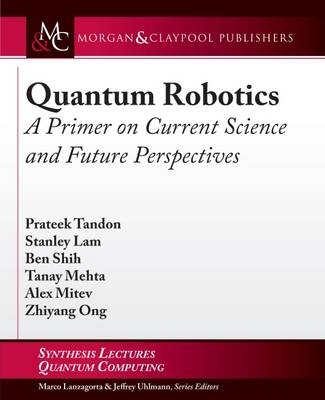
Quantum Robotics
Morgan and Claypool Life Sciences (Verlag)
978-1-62705-913-8 (ISBN)
Prateek Tandon is the founder of the Quantum Robotics Group. He obtained his Ph.D. from the Robotics Institute at Carnegie Mellon University and his B.S. in Computer Engineering, Computer Science from the University of Southern California. His Ph.D. dissertation focused on Bayesian methods for sensor fusion and extracting structure from multiple noisy data observations. Having previously written on optimizing many classical machine learning methods for robotic sensing, improving fault tolerance and runtime scalability, Prateek's research interests include exploring the new possibilities that quantum methods and quantum machine learning hold for robotic perception, learning, and planning. Stanley Lam holds an M.Sc. in Social Research Methods from the London School of Economics and a B.S. with Honors in Business Administration (Global Management) from the University of Southern California. His work deploys research methodologies toward solving real-world problems in business and technology. Some prior work includes modeling Silicon Valley labor patterns using Gini coefficients, graphing public sector workforces with nonparametric estimators, and developing user studies for assistive technology. He led discussions in the Quantum Robotics Group on recent hardware advances in quantum research, and is dedicated to understanding the latest quantum computing implementations, their prospects for scalability and commercialization, and the challenges which remain in order for quantum robotics to be fully realized. Benjamin Shih is a Ph.D. student in Mechanical and Aerospace Engineering at the University of California, San Diego. He holds an M.S. and B.S. in Electrical and Computer Engineering from Carnegie Mellon University (2013) and has been a research assistant at Ecole Polytechnique Federale de Lausanne. His main area of research is soft robotics, an intersection of control, materials, and cognitive science. Ben led discussion of quantum control in the Quantum Robotics Group. Tanay Mehta is a Ph.D. student in Computer Science at Northeastern University. He holds a B.S. in mathematics from the University of Southern California. His research is focused on the theoretical aspects of computer science and the fundamental limits of computation. He is interested in the role of pseudo-randomness in complexity theory and cryptography. Tanay served as the lead for quantum information theory discussions in the Quantum Robotics Group. Alex Mitev holds a Ph.D. in Electrical Engineering from the University of Arizona. His main research interests are in statistical modeling, model order reduction, machine learning, and dynamic programming. He has published several papers analyzing problems of timing analysis, macro-modeling, and the impact of process variations for VLSI circuits. Alex led discussions of quantum circuits in the Quantum Robotics Group. Zhiyang Ong is an Electrical Engineering Ph.D. student at Texas A&M University. He received his M.S. in Electrical Engineering from the University of Southern California and his Bachelor of Engineering (Electrical and Electronic) from the University of Adelaide. He has interned at the Institute of Microelectronics and Bioinformatics Institute in Singapore, Symantec Corporation in Santa Monica, California, and the University of Trento in Trento, Italy. He has also studied at the University of Verona and National Taiwan University. He is a student member of IEEE and ACM and is a member of IEEE-Eta Kappa Nu. Zhiyang led discussions of quantum modeling checking in the Quantum Robotics Group.
Preface
Acknowledgments
Notation
Introduction
Relevant Background on Quantum Mechanics
Quantum Search
Quantum Agent Models
Machine Learning Mechanisms for Quantum Robotics
Quantum Filtering and Control
Current Strategies for Quantum Implementation
Conclusion
Bibliography
Authors' Biographies
Index
| Erscheinungsdatum | 19.02.2017 |
|---|---|
| Reihe/Serie | Synthesis Lectures on Quantum Computing |
| Verlagsort | San Rafael, CA |
| Sprache | englisch |
| Maße | 191 x 235 mm |
| Gewicht | 300 g |
| Themenwelt | Informatik ► Theorie / Studium ► Künstliche Intelligenz / Robotik |
| Naturwissenschaften ► Physik / Astronomie ► Quantenphysik | |
| ISBN-10 | 1-62705-913-X / 162705913X |
| ISBN-13 | 978-1-62705-913-8 / 9781627059138 |
| Zustand | Neuware |
| Haben Sie eine Frage zum Produkt? |
aus dem Bereich


